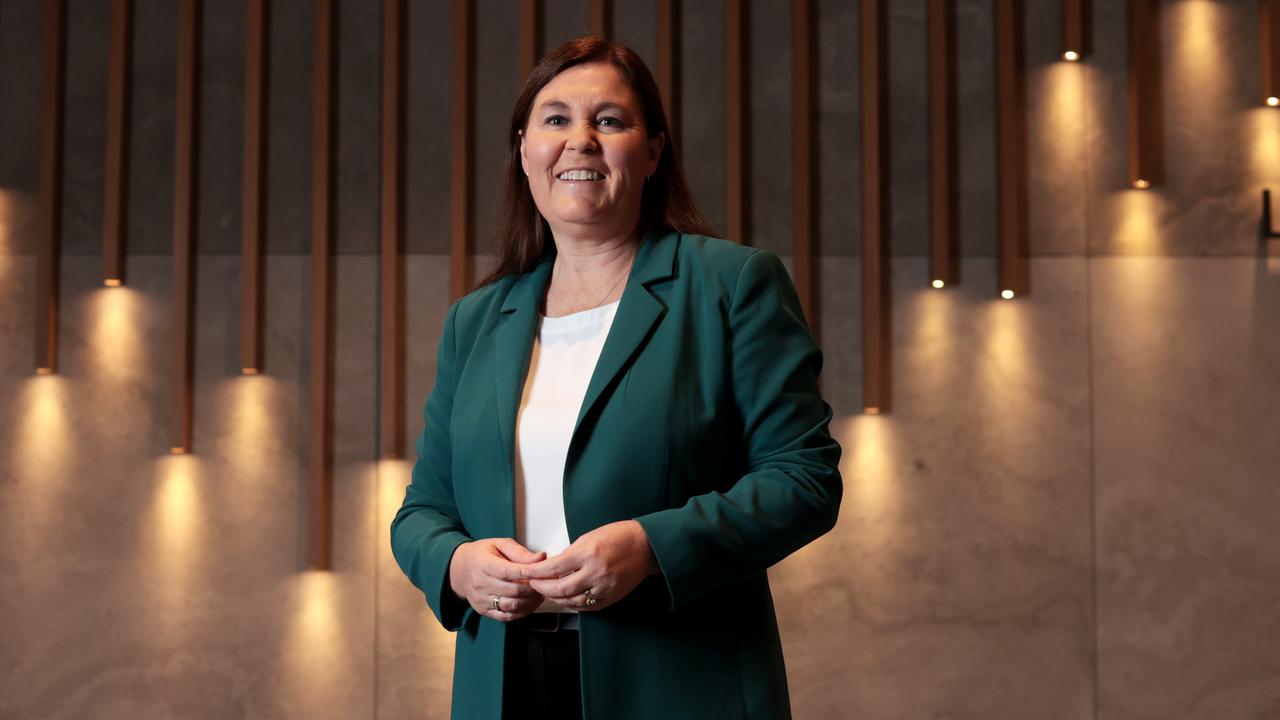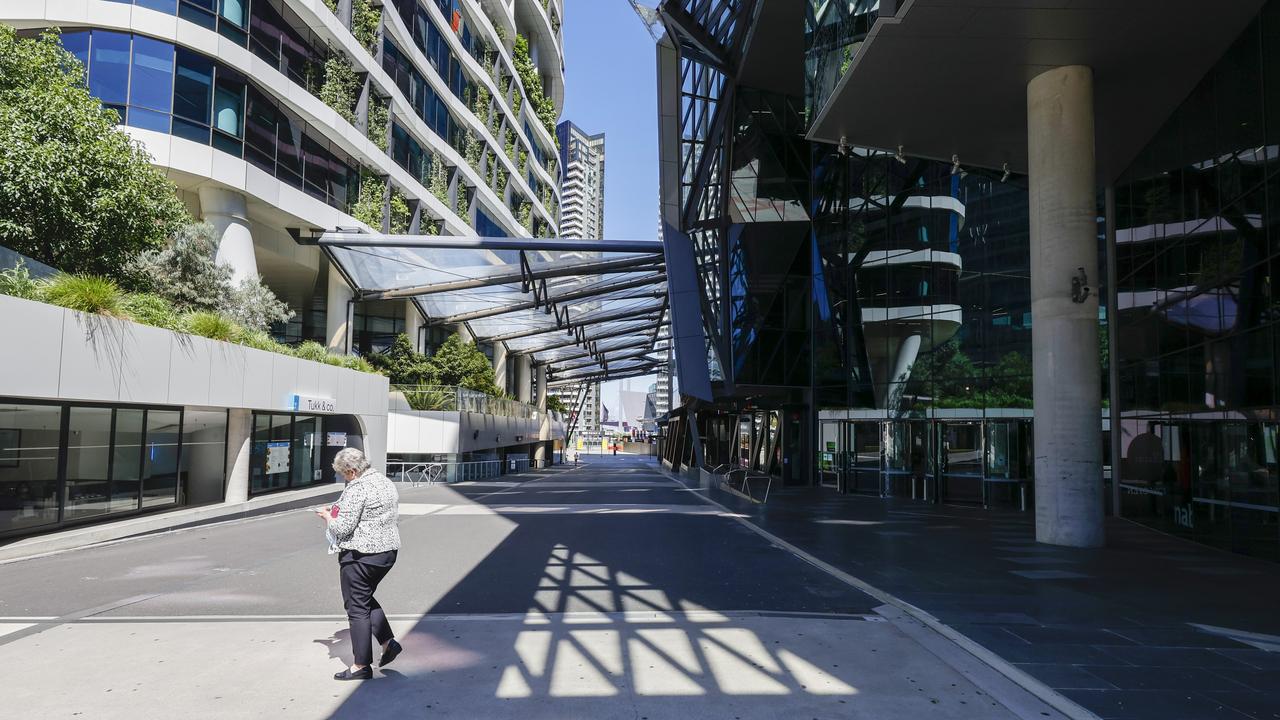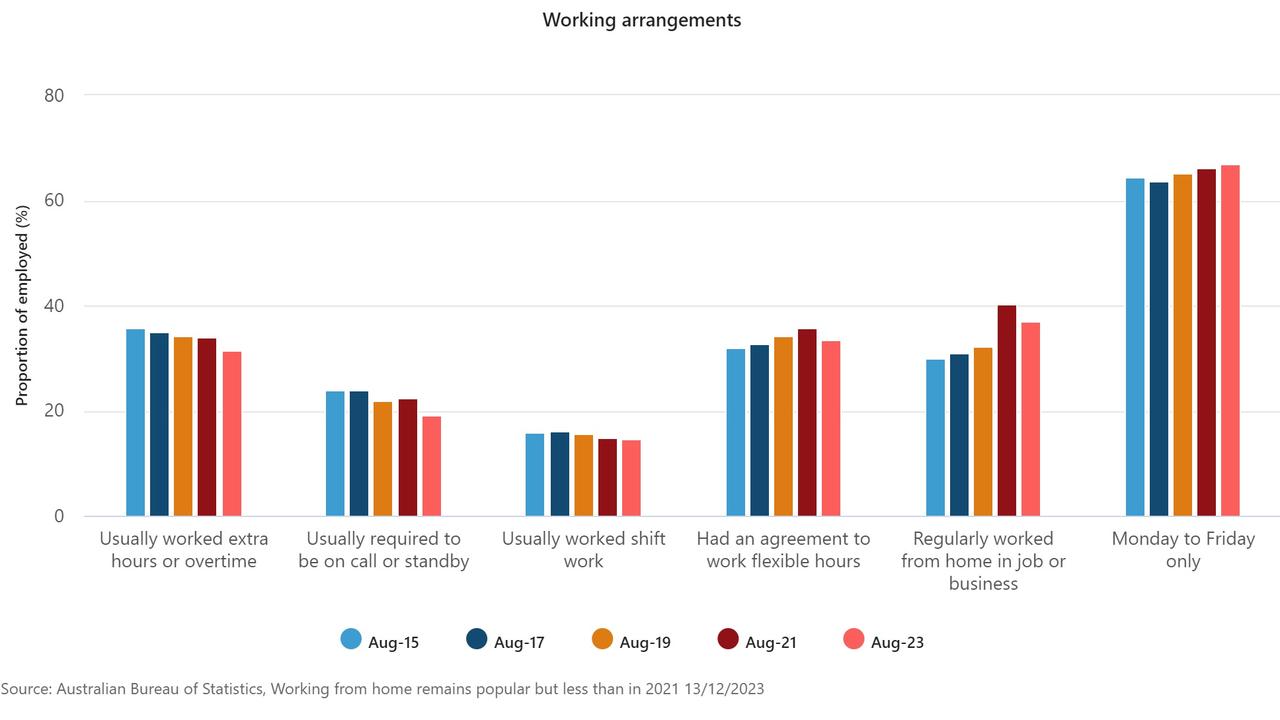Working from home: Three days is the new five-day week in the office
Australia’s bosses have spent the year stepping up efforts to bring staff back into the office more often. However, workers still have the upper hand.

Australia’s bosses have spent this year stepping up efforts to bring staff back into the office more often.
But most have long given up the battle to get workers returning to their desk full-time – and three days is becoming the new normal.
Some companies work around “anchor days” and others are putting the pressure on managers to lead by example to be in the office at least four days a week.
All bosses want to see staff at work in person and on a regular cycle, arguing mounting evidence shows it is critical for productivity, building teamwork and career development, especially for younger staff.
These are the views of the nation’s top chief executives from The Australian’s 2024 CEO Survey who have spent the past year gradually raising the pressure over working-from-home policies.

However, bosses are acutely aware by moving too fast they risk coming off second best in the war for talent. A tight jobs market, even in the face of a slowing economy, has meant that employees retain the upper hand for now.
It’s a global phenomenon which companies in the US and UK are also grappling to get their staff back into the office.
Detailed feedback from more than 70 of the nation’s top CEOs across every sector of the economy show that three days is the new five day working week in the office. Some workplaces have this as prescriptive and others are built in as guidance.
At ANZ staff are now expected to spend a minimum of 50 per cent of their scheduled work time in the office. Even so, chief executive Shayne Elliott acknowledges it can’t be a one-size-fits-all approach
“We have a diverse workforce spanning 29 countries doing very different jobs. Productivity for a contact centre is very different to productivity for a foreign exchange trader, or a banker in commercial, or a software engineer,” he says.
CEO Survey 2024

Three is the new five-day week in the nation’s offices

The NT’s best real estate agents recognised at REINT Awards

Treasurer demands Andrews get moving to rebuild Victoria

What Trump’s positive COVID test means for the US election

Electric truck founder’s downfall

Space agency recruiting ‘alien hunters’

Trump’s doctor issues official update

How MCG plans to get fans back in seats

Escaped emu calmed with pear

‘I thought I was going to die’

‘Too fat’ Boris sheds the weight and regains his ‘mojo’
“That’s why we are principals-based – we do what works and that will continue to evolve.”
Energy major AGL introduced a policy this year under which corporate employees are expected to work in the office three days a week. Two of these days are set as anchor days whereby all members of a team are in the office at the same time. The third day is at the workers’ discretion.
“We believe this strikes a balance,” AGL boss Damien Nicks tells The Australian. It sets staff up for a “connection, collaboration and opportunities to learn”.

Commonwealth Bank’s Matt Comyn says that since July a “vast majority” of staff have been spending 50 per cent of their working month in the office. This finds a balance between committing to flexible working and ensuring staff deliver the best outcome for staff.
Westpac has a policy of two to three days a week in the office but is not prescriptive about the days.
Years after the Covid-19 pandemic hit, working from home is on the rise again. Figures released this month by the Australian Bureau of Statistics show the trend of working from home is again driving up to the high point of 40 per cent in August 2021 when restrictions around the Delta variant of the virus were in place around much of Australia.
Latest data shows 37 per cent now work from home regularly. Managers and other professionals were most likely to be working from home at 60 per cent compared with 22 per cent across other jobs.
Law firm Ashurst has a hybrid working policy, and most of its staff spend at least 60 per cent of their work week in the office, says Ashurst chief Paul Jenkins. However he believes the office will always play an important role for collaboration and career development of staff.

BHP chief executive Mike Henry says flexible work has been a “game changer” playing a role in helping to bring more women to the global miner’s workforce. Even so, BHP has guidance of three days for office-based employees to generate new ideas.
Wesfarmers boss Rob Scott says there are many jobs that can’t be done remotely such as retail and warehouses, although the retailing giant offers flexibility at work.
Mr Scott says Wesfarmers highest performing teams are committed to in-person interaction.
Bendigo Bank supports a hybrid way of working. However, the lender’s chief, Marnie Baker, says there is also a need to balance this. She believes workers need to be together to create a vibrant culture and innovate. “In line with this, I expect to see our people in the office the majority of the time,” Baker says.
Telstra boss Vicki Brady says the debate has moved on from flexible working to now ensuring the telco is “brilliant” at hybrid working. “We know our people are at their best when they have choice,” she says.
Investment bank Citi Australia told its staff they need to be in the office for a minimum of three days to create a culture of collaboration and idea sharing.
“Banking is a relationship-driven business, so a good proportion of our workforce needs to be in the office most days,” Citi boss Mark Woodruff says.

Rather than taking a prescriptive approach to all staff, Insurance Australia Group has encouraged managers to take a lead to what works best with their own team.
However Nick Hawkins says there is an expectation for senior leaders to spend more time in the office.
Insignia Financial, which oversees financial advice brand MLC, this year moved to a policy of spending 40 per cent of working days in the office. Since then there has been a noticeable uptick in culture, decision making and tackling complex problems, says Insignia’s Renato Mota.
The $2.7bn software start-up, SafetyCulture, has most of its staff on a flexible arrangement. However founder and chief executive Luke Anear says the discussion should be on what is the best outcome for customers.
Still, he says career development is important in an office environment, particularly for younger staff. “We learn a lot through observing others, from role modelling and informal conversations, and it’s hard to get that from Zoom calls,” he says.
WiseTech chief Richard White says the benefits of hybrid working helps staff retention and keeps engagement levels high. “It’s not just about having time in the office, it’s about the purpose of that time,” White says.
Energy major Santos is moving away from permeant work-from-home arrangements. “The clear evidence is that human interaction and collaboration is what provides the competitive advantage in our industry,” says chief executive Kevin Gallagher.
The move comes as Santos trials other measures, including a compressed fortnight where staff are allowed to work over nine days instead of 10 as long as they have the same productivity outcome.
Still, the move to three days in its office brings its own complications, with workplaces experiencing a surge in demand.
“Our meeting rooms certainly come alive between Tuesday to Thursday each week,” says Tyro Payments chief Jon Davey.
Originally published as Working from home: Three days is the new five-day week in the office



